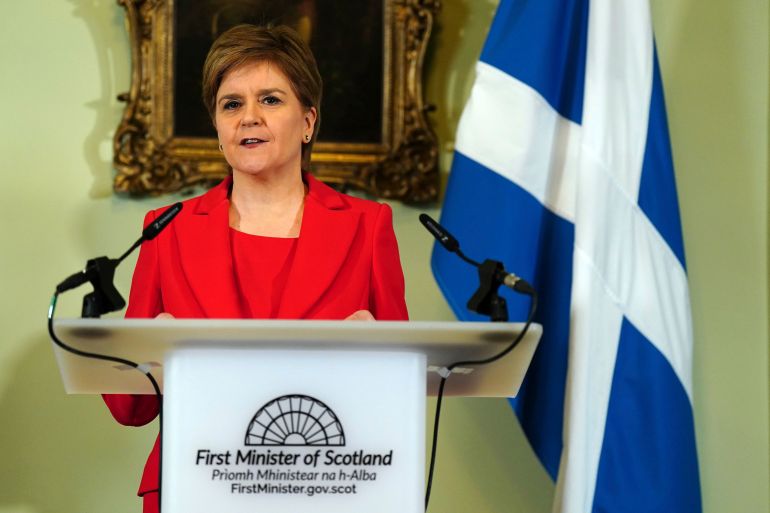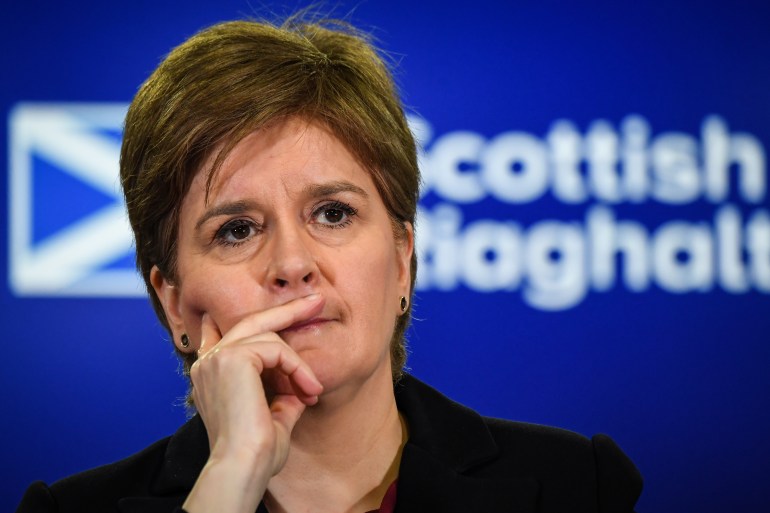Scotland’s First Minister Nicola Sturgeon resigns
Sturgeon became the leader of the ruling Scottish National Party in the wake of its 2014 independence referendum.

Scotland’s First Minister Nicola Sturgeon has resigned after eight years in the job.
“This decision comes from a deeper and longer-term assessment. I know it might seem sudden, but I have been wrestling with it, albeit with oscillating levels of intensity, for some weeks,” said Sturgeon as she announced her resignation on Wednesday.
Keep reading
list of 3 itemsUK gender battle stirs talk of independence in Scotland
Scotland’s gender recognition bill would have harmed women
She became the leader of the ruling Scottish National Party (SNP) in the wake of its 2014 independence referendum when the country voted 55 percent to remain as part of the United Kingdom.
“Essentially, I’ve been trying to answer two questions. Is carrying on right for me? And, more importantly, is me carrying on right for the country, for my party and for the independence, [the] cause I have devoted my life to?
“I understand why some will automatically answer ‘yes’ to that second question. But, in truth, I have been having to work harder in recent times to convince myself that the answer to either of them, when examined deeply, is yes, and I’ve reached the conclusion that it’s not,” she said.
Sturgeon will remain in her position until her successor is elected as Scotland’s first minister and will remain a member of the Scottish Parliament.
Reacting to the resignation, fellow party leader Ian Blackford said Sturgeon was the “finest First Minster Scotland has ever had, and the finest friend anyone could hope for”.
“When Scotland wins independence, she will have been its architect and builder. She has laid the foundations we all now stand on. We owe it to her to finish the job,” he wrote on Twitter.
Nicola Sturgeon is the finest First Minster Scotland has ever had, and the finest friend anyone could hope for.
When Scotland wins independence, she will have been its architect and builder. She has laid the foundations we all now stand on.
We owe it to her to finish the job.
— Ian Blackford 🇺🇦🏴 (@Ianblackford_MP) February 15, 2023
Under her tenure, Sturgeon led SNP to a resounding success in the 2015 UK election, winning 56 of 59 seats in Scotland and establishing it as Britain’s third-largest party, before she retained control over the devolved parliament in more recent elections.
She was also a critic of the UK’s departure from the European Union – a move opposed by a majority of voters in Scotland – and said she wanted a new referendum before the end of 2023.

Gender recognition bill
Sturgeon had recently become embroiled in a row over transgender policies after Scotland passed a Gender Recognition Reform Bill, making it easier for people to change their legal gender.
But British Prime Minister Rishi Sunak’s government blocked the bill because it could affect the law in the rest of the UK.
SNP also suffered a blow in November when the UK’s top court ruled that the Scottish government could not hold a second referendum without approval from the British Parliament.
Successive Conservative governments in London have said the 2014 referendum was a once-in-a-generation decision and could not be repeated so soon.
Sturgeon said in response that she would turn the next British general elections into a de facto referendum to ramp up pressure on London to grant another vote.